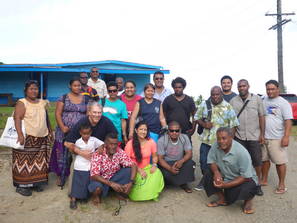Related News

Imagine a Pacific with all the coral reefs dead and everyone living in cities…or abundant with fish to feed all our families. Seventeen Pacific Island co-managers from government, non-government and community-based organizations who work closely with communities in resource management are training at the University of the South Pacific to help ensure the second scenario happens and not the first. The Pacific Island Community Co-management Course was designed by USP and SPREP in 2000 and is being offered for the fifth time, this time especially in conjunction with the Locally Managed Marine Area Network (LMMA). The participants, who represent ten countries, have spent a month learning from each others’ experience and gaining new skills to be used helping communities to develop sustainably, considering sociocultural, environmental and economic aspects. They will then spend five months trying out new approaches in their work place and then reconvene towards the end of the year to share experiences in implementing these projects.
Mr. Shem Bal, the elder of the group, commented, “Even though my island of Vanuatu had just suffered a devastating cyclone, I decided to come to this course anyway in the hope of learning new ways to help my island with food security after the cyclone. I will be doing my project in ways of propagating wild yams and sharing this with my community so when the next cyclone comes we will have plenty of food.”
Professor Bill Aalbersberg of the Institute of Applied Science at USP, which is hosting the course, mentioned, “Previous participants of the course are now leaders in government and conservation societies in the region. Their sponsors report that they return with much more confidence and willingness to provide new ideas.”
This year, the course has received funding support from two regional programmes with a protected area focus; MACBIO – funded by the German government through the German Agency for International Development Cooperation (GIZ) in close collaboration with IUCN and SPREP, and the Biodiversity and Protected Areas Management programme (BIOPAMA), funded by the intra-ACP envelope of the European Commission’s 10th European Development Fund and implemented by the International Union for the Conservation of Nature (IUCN). Several Suva-based organisations have contributed to the teaching of the course, giving their time and enthusiasm to present classes, conduct field trips and share experiences. Some northern Pacific participants had their air fares paid by their employers in support of the course.